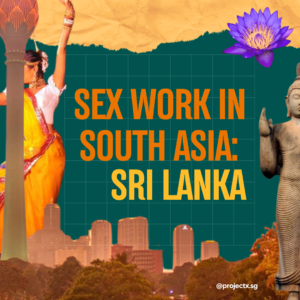Preface: This is the third post in Project X’s new series ‘Sex work in ASEAN nations’ – a series designed to encourage greater understanding of, and dispel common myths about, sex work in the region. This series will consider the state of the sex industry and sex workers rights in each of the 10 ASEAN countries. It will consider the unique historical, cultural, political and economic circumstances of that country, as well as why the decriminalisation of the industry is crucial for the region’s economic and political development.
A Brief History of Sex Work in The Philippines
Whilst sex work generally is considered the ‘world’s oldest profession’, in the Philippines, the concept is relatively new. Historians say that the practice seemed non-existent before the arrival of Spanish colonists. Prior to the arrival of the Spanish, Filipina women enjoyed equal status to men. They were allowed to inherit property, chose their own marriage partners, get divorced, to be free sexually, and to occupy high spiritual positions. In this context, sex work is often viewed in the Philippines as a Spanish import.
The sex industry flourished in the 19th century, prompted by a changing socio-economic situation. During this period, most of these workers were underprivileged and often underage. At the turn of the 19th century, the Philippines entered another period of struggle characterised by the Filipino fight for independence. In 1896 there was the first revolution, then the second began in 1898. A year later, the Spanish-American war began which was paralleled by the Filipino-American war. In 1899 a period of ‘pacification’ began, which was followed by nearly 50 years of American colonisation in the Philippines. During the crisis phase at the beginning of the century, the Philippines was plagued with foreign soldiers; both Spanish and American. This created an unprecedented demand for sexual services for the ‘rest and recreation’ of the troops.
From the early 20th century onwards, the presence of American bases in the Philippines (established during the ‘crisis phase’ and maintained during occupation) attracted sex workers to the areas where the bases were. Whilst the numbers of sex workers remained relatively constant for the first half of the 20th century, they soared when the war began in Vietnam. This is because once again, Filipino bases became heavily populated by American and other foreign soldiers.
The Vietnam War established numerous prominent centres of ‘rest and recreation’ including the city of Angeles which supported the Clark Air Base, and the town of Olongapo which was adjacent to the US naval base in Subic Bay. Throughout the conflict, hundreds of ships and hundreds of thousands of servicemen passed through Angeles and Olongapo. In 1973, for example, the average daily rate of visiting sailors in Subic was 8,000, spending over $29 million in Olongapo that year.
Both bases are now closed. The Clark Air Base was closed in 1992 after it was mostly destroyed by Mount Pinatubo’s eruption in 1991. The base at Subic was closed early in 1986, and its closure attracted much protest and resistance from sex worker communities, however these protests received little media coverage. Presently, the United States and the Philippines are in discussions about whether the Subic Bay base will be made available to the U.S troops once again as the two countries discuss defensive ties in response to China’s activities in the South China Sea.
Law, Policy, Policing
There is tension in the laws regulating sex work in the Philippines. Sex work and profiting from sex work are illegal under the ‘Revised Penal Code’. Article 202 of the Code defines sex workers (or ‘prostitutes’ as per the language of the Code) as ‘women who for money or profit, habitually indulge in sexual intercourse or lascivious conduct’. Article 202 imposes fines or imprisonment on sex workers. The Code, as per Article 201, also covers ‘immoral doctrines, obscene publications, exhibitions, and indecent shows’. Article 201 may be used by police to lay charges as a result of raiding entertainment establishments. This article is sufficiently wide to charge both sex workers and venue owners if sex work is found to occur on the premises. So whilst there are laws in place which criminalise sex workers, as well as those who organise sex work, those who purchase sex are not criminalised.
However, the major tension in sex worker policy in the Philippines is not the selective criminalisation of those engaging with the industry, but the characterisation of the people who provide sexual services. The Penal Code clearly criminalises sex workers and paints them as criminals and deviants. But anti-trafficking laws instead conflate sex work with the status of victimhood and call for sex workers to be ‘saved ’. The Philippines was the first country in Asia to ratify the 2001 United Nations Human Trafficking Protocol, and subsequently enacted its own anti-trafficking legislation. The Philippine Anti-Trafficking in Persons Act (2003) defines ‘taking advantage of the vulnerability of a person…for the purpose of exploitation’ including for the provision of sexual services, as ‘trafficking’. It’s a very broad definition that could even cover consensual arrangements between sex workers and their managers. Additionally the ‘Magna Carta of Women’, a Filipino Act of Parliament, clearly names sex work as an act of violence committed against women.
The combination of laws that simultaneously criminalise and ‘seek to protect’ sex workers creates a double bind for those providing sexual services. It places them in a confusing and precarious legal position which can lead to further vulnerability, stigmatisation, and exclusion. Police officers are known to take advantage of this legal limbo, and extort money from sex workers under the anti-trafficking laws. Additionally, from a public policy perspective, the use of an anti-trafficking narrative can be seen as a strategic tool to stifle sex worker advocacy. Defining sex work as a policy problem and something ‘done to women’ obfuscates the fact that for many women, sex work is the most desirable option available to them when compared with low-paid factory or retail work.
Sex Worker Statistics & Their Economic Impact
Because of the illegal and clandestine nature of sex work in the Philippines, it can be challenging to find recent and authoritative statistics pertaining to sex workers and their economic contributions. However, a 1998 report conducted by the International Labour Organisation estimates that the number of sex workers in the Philippines ranges from 100,000 to 600,000. The likelihood is that there are nearly half a million sex workers in the country. This figure of 500,000 was echoed in a press release by the House of Representatives of the 19th Congress in 2010, and reinforced by the NGO ‘Women Hookers Organizing For Their Rights and Empowerment’ (now part of the Philippine Sex Workers Collective) in 2013.
Although there are no official records of sex workers’ contribution to GDP in the Philippines, an ILO-endorsed study suggests that the sex industry may account for anywhere from 2-14% of GDP. Regardless of sex workers’ current contributions to GDP, they have clearly made historical contributions to the country’s economy. In the late 70s, as the World Bank began to promote tourism as an agent of development, Filipina women were used to sell the country as a tourist destination. The strategy worked and despite the country being in a recession at the time, tourist arrivals doubled to one million between 1975 and 1980. By 1989 the tourist industry had an annual earning of US$1.6 billion, making tourism one of the country’s top three dollar earners. To this day, tourism is a significant contributor to the Philippines’ economy. In 2021, 5.2% of the Philippines’ GDP came from tourism. But prior to the pandemic, in 2019, 12.9% of the Philippines GDP came from the sale of tourism-related products. Whilst it would be wrong to conflate the earnings of the tourism industry with those of the sex industry, many tourists do seek sexual services whilst in the Philippines, and thus sex workers clearly contribute to the revenue earned through tourism.
Filipino Culture, Religion, and Social Norms
The Philippines’ unique colonial history and dominant religion create a dangerous cocktail of social norms and mores that not only deny sex workers legal rights, but their dignity, humanity, and the possibility of equality as well. The Philippines is a unique stronghold of catholicism in Asia. According to Bonnet (2017, p. 41), Filipino society is deeply rooted in patriarchal traditions which condemn sexual relationships before marriage, and above all else considers sex work as a moral aberration and source of national shame. The country’s colonial history also influences the dominant views pertaining to sex work as well. Sex work is seen as a legacy of racism and imperialism, in part because of the specific colonial dynamics by which the sex industry first emerged – under successive periods of occupation by foreign forces.
According to 2020 census data, approximately 78.8% of Filipino households are Roman Catholic. Consequently, Catholic teachings pervade everyday social interactions and shape dominant discourses. Religious tenets pertaining to sex, and particularly sex before marriage, create tension for Filipina sex workers. According to an ILO report, 20 percent of Filipina sex workers interviewed said they were ‘conscience-stricken because they still considered sex with customers a sin’. But in her research, Sharmila Parmanand (2019) recounted sex workers who explained feelings of pride about their work because they thought of it as honest work which was able to improve their family’s quality of life.
In addition to the subtle ways that Catholicism shapes perception and discussion, the Catholic Church in the Philippines is highly politically active. It exerts a strong influence on the electability of politicians and has played a role in blocking legislation on topics pertaining to contraception and LGBTQ+ rights. Consequently, advocacy for sex workers’ rights in the Philippines is limited, as it is clear to anyone who may support sex workers, that public advocacy would come with a high political price.
The Hope for Law Reform
Because of the pervasiveness of anti-sex worker narratives, before law reform can realistically be contemplated, it’s best to think of the necessity of a cultural shift.
The lack of support for sex workers’ rights in the Philippines contributes to anti-sex worker sentiment, and the dominance of the ‘victim perspective’. There are no major anti-trafficking or women’s rights organisation that publicly support sex workers’ rights. Sharmila Parmanand suggests that the absence of a visible sex workers’ rights movement, owing to criminalisation, stigma, and a woeful lack of resources, no doubt reinforces the dominance of the anti-sex work position in the Philippines.
Consequently, advocacy and rights recognition are necessary to challenge cultural biases. Sex work is work, and sex work, like all labour, exists on a spectrum. Just because trafficking exists within the industry, does not mean that all who work within it necessarily must be trafficked. This view obfuscates the consent and agency of sex workers who choose to engage in sex work because it presents the best employment opportunity available to them.
Meaningful law reform in the Philippines could look like the removal of the articles under the ‘Revised Penal Code’ which criminalise sex work, and the removal of the sections of the ‘Magna Carta of Women’ which wrongly conflate sex work with human trafficking. But unless advocates are emboldened to promote the human rights of sex workers, and socio-cultural attitudes start to shift, it is likely the law will remain hostile to sex workers’ rights.
References
Bar girls run off strikers at U.S. base in Philippines (1986) Orlando Sentinel. Orlando Sentinel. Available at: https://www.orlandosentinel.com/news/os-xpm-1986-03-31-0210170032-story.html (Accessed: April 5, 2023).
Bonnet, F.-X. (2017) “From Oripun to the yapayuki-san: An historical outline of prostitution in the Philippines,” Moussons, (29), pp. 41–64. Available at: https://doi.org/10.4000/moussons.3755.
Catholics make up nearly 79% of Philippine population (2023) Business World Online. Available at: https://www.bworldonline.com/the-nation/2023/02/22/506351/catholics-make-up-nearly-79-of-philippine-population/ (Accessed: April 5, 2023).
Dangwal, A. (2023) US, China rivalry reignites ‘activity’ at former US naval base in Subic Bay that is only ’30 mins away from Taiwan’, Latest Asian, Middle-East, EurAsian, Indian News. The Earasian Times. Available at: https://eurasiantimes.com/us-china-rivalry-reignites-activity-at-former-us-naval-base-in-subic-bay/ (Accessed: April 5, 2023).
Goodwin, J. (2012) “Sex Work and the Law in Asia and the Pacific.” Bangkok: United Nations Development Programme.
Holliday, J.K. (2022) “Claiming victimhood within the sex industry—how the trafficking agenda interacts with sex worker rights,” Polity, 54(4), pp. 866–873. Available at: https://doi.org/10.1086/721558.
Joven, J. (2020) Does sex work truly empower women?, CNN Life. CNN. Available at: https://www.cnnphilippines.com/life/culture/2020/3/24/sex-work-debate.html (Accessed: April 5, 2023).
“Lawmakers move to decriminalize prostitution” (2010) Press Releases [Preprint]. Abigail A. Modino, MRS-PRIB, Press and Public Affairs Bureau. Available at: https://www.congress.gov.ph/press/details.php?pressid=4676#:~:text=There%20are%20about%20500%2C000%20sex,being%20exploited%20by%20crime%20syndicates (Accessed: April 5, 2023).
Lim, L.L. (1998) The sex sector: The economic and social bases of prostitution in Southeast Asia. Geneve: International Labour Office.
McEvoy, M. (1993) “Gender Issues in the Informal Sector: A Philippine Case Study,” Development Review [Preprint].
Moselina, L.M. (1979) “Olongapo’s rest and recreation industry: a sociological analysis of institutionalised prostitution,” Philippine Sociological Review, 27(3). Available at: https://doi.org/https://www.jstor.org/stable/23892390.
Parmanand, S. (2019) “The Philippine Sex Workers Collective: Struggling to be heard, not saved,” Anti-Trafficking Review, (12), pp. 57–73. Available at: https://doi.org/10.14197/atr.201219124.
Parmanand, S. (2021) Institutionalised victimhood: The ‘progressive’ alternative for sex work in the Philippines, openDemocracy. Available at: https://www.opendemocracy.net/en/beyond-trafficking-and-slavery/institutionalised-victimhood-the-progressive-alternative-for-sex-work-in-the-philippines/ (Accessed: April 5, 2023).
Prostitution in the Philippines (2023) Wikipedia. Wikimedia Foundation. Available at: https://en.wikipedia.org/wiki/Prostitution_in_the_Philippines (Accessed: April 5, 2023).
Share of Tourism to GDP is 5.2 Percent in 2021 (2022) Philippine Statistics Authority. Republic of the Philippines Statistics Authority. Available at: https://psa.gov.ph/content/share-tourism-gdp-52-percent-2021 (Accessed: April 5, 2023).
Stoltzfus, B et al, (1988), Hospitality, What Price?, Olongapo, Buklod. US armed forces withdrew from Subic Bay in September 1992.
Strangio, S. (2020) Former US bases in the Philippines prompt mixed feelings, Politics South East Asia. The Diplomat. Available at: https://thediplomat.com/2020/09/former-us-bases-in-the-philippines-prompt-mixed-feelings/ (Accessed: April 5, 2023).
The Philippines | Global Network of Sex Work Projects (no date). Global Network of Sex Work Projects. Available at: https://www.nswp.org/country/the-philippines (Accessed: April 5, 2023).






